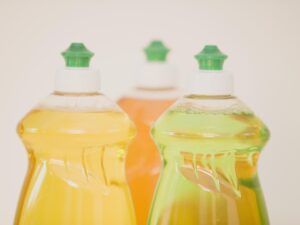
From December 31, 2023, Ukraine will limit to a minimum the content of phosphates and other phosphorus compounds in household detergents (up to 0.1-0.2 gram), and from December 31 of the same year to December 31, 2026 will gradually limit the content of phosphates in industrial detergents (up to 0.05-0.1%). The relevant resolution on amendments to the technical regulations for detergents was adopted by the government at a session on Wednesday.
According to it, the document suggests limiting the content of phosphates in laundry detergents for household washing machines to 0.2 gram at the recommended wash dose for the main washing machine cycle, and in household dishwashers – up to 0.1 gram at a standard dose for loading a dishwasher with a table set for 12 persons.
In addition, from the same date, the mass fraction of total phosphorus in detergents for hand washing, laundry and cleaning, as well as in other detergents, is limited to 0.05% phosphorus.
At the same time, the previous technical regulation included only a washing powder (with a limitation of the phosphorus content to 0.5 gram in the dose recommended for washing in a washing machine) and a detergent for household dishwashers (0.3 gram), but the new edition suggests replacing a washing powder into a detergent for laundry and detailing into products for household and industrial use.
Limits on the content of total phosphorus in detergents used for industrial laundry, washing and cleaning are introduced in stages: in detergents for industrial washing machines it should be reduced from 0.1% from December 31, 2023 to 0.05% as of December 31, 2026, and for industrial dishwashers – from 0.25% to 0.1%.
At the same time, the voluntary application of the established restrictions is possible before the specified dates.
According to the document, the Cabinet of Ministers ordered the Ministry of Economy to update the List of National Standards for determining methods of testing detergents for compliance with the technical regulations within six months from the date of entry into force of the resolution.
In addition, the ministry, together with the Ministry of Natural Resources, the State Customs Service and the State Service for Food Safety and Consumer Protection, must develop and submit for approval to the Cabinet of Ministers a draft plan of measures for state market supervision and control of products for compliance with the technical regulations.
The regulation is effective six months from the date of publication (excluding the established dates for the reduction of phosphate content).
The explanatory note to the document notes that, according to official statistics, in recent years, there has been a tendency for a significant amount of phosphate-containing pollutants to enter the water bodies of Ukraine.
Meanwhile, the introduction of restrictions on the content of phosphates in detergents allows expecting a significant improvement of the ecological state of Ukrainian water bodies, primarily large rivers – the main sources of drinking water supply, in particular, reducing their eutrophication (bio-mass generation in a water-body).

Specialists from the Ministry of Ecology and Natural Resources, the Ministry of Economy, the State Service for Food Safety and Consumer Protection and the Government Office for Coordination on European and Euro-Atlantic Integration are working on a draft resolution gradually reducing the content of phosphates and phosphorus compounds in household and industrial detergents.
According to a press release of the State Service for Food Safety and Consumer Protection, the Cabinet of Ministers is developing a draft resolution on amendments to the technical regulations for detergents together with the above agencies.
“Many manufacturers of detergents in other countries have already abandoned the use of phosphates, which can negatively affect human health and the environment, and switched to safer alternatives. The State Service for Food Safety and Consumer Protection supports making of this important decision in Ukraine,” Head of the authority Vladyslava Mahaletska said.
The resolution plans to amend the Technical Regulations for Detergents, as well as update the list of national standards for test methods for detergents and amend a number of other documents.
A draft action plan on state supervision and state control of products for compliance of detergents with the requirements of technical regulations will also be submitted to the Cabinet of Ministers for consideration.